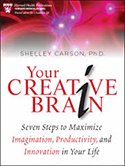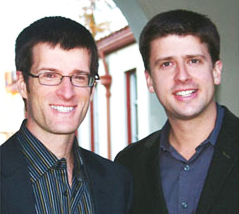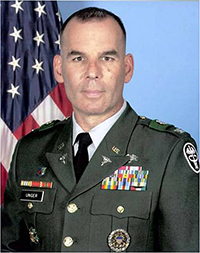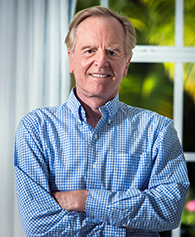
John Sculley
“Gerard, you are in the sweet spot of a big juicy healthcare problem. Adherence is a chronic problem and on everyone’s radar in healthcare. You are right there proving you can drive engagement. You offer a better way forward.”

former CEO Apple and PepsiCo.
Healthcare IT investor

Ellen Embrey
“Gerard, your approach and platform tools enable individuals and organizations to see, learn and feel their way through challenges and outcomes. Emotive Storytelling brings meaning to people regarding their issues. That’s powerful.”
Ellen Embrey
Managing Partner, Stratitia & 2c4 Technologies
Former Acting Assistant Secretary of Defense for Health Affairs
Former Acting Director, Tricare Management Activity, Military Health System
Former Deputy Assistant Secretary of Defense for Force Health Protection & Readiness
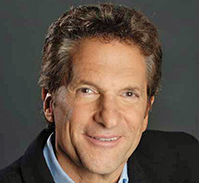
Peter Guber
“There’s no business without story business. To connect, persuade and triumph in business you need to ‘tell to win’ with the hidden power of story. Stories create a relationship rather than a transaction. Stories open the heart rather than alert defenses and trigger resistance.”
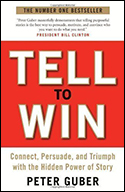
Former CEO Sony Pictures, Academy Award Producer
Author Tell to Win
![]() “Research has shown that improvements in mental health and general well-being result through sharing of stories.” – Legacy Stories – WSJ Feb 2014
“Research has shown that improvements in mental health and general well-being result through sharing of stories.” – Legacy Stories – WSJ Feb 2014

Magic Johnson
“Telling purposeful stories to win moves people to action because stories get people’s attention and changes their mindset. All leaders need to be storytellers and companies need to tell their story powerfully.”
Magic Johnson
Los Angeles Lakers Hall of Fame superstar
Investor and entrepreneur

Larry Smarr, PhD
“Gerard, this is compelling. As I always say, storytelling was the first critical human technology. Fire came later.”
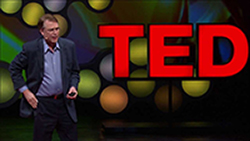
Big Data Scientist, a founding father of the Internet
Director, Supercomputer Center, UC San Diego
California Institute for Telecommunications and Information Technology

“Audience attention, recall and response are enhanced by storytelling.”
E. Peters PhD
Psychological Science

Arianna Huffington
“Facts and statistics are great, but humans are creatures of narrative. Illustrating the lives and stories of real people — there is nothing more powerful and engaging. Marketers need to be master storytellers.”
Arianna Huffington
Author and syndicated columnist

James Rosser, MD, FACS
“Gerard, I love what you are doing here. You are telling stories that have a clear objective. They are believable and passionate. It’s not manipulating or managing people. It’s about engagement. This is the way to move providers and patients to action.”
James Rosser MD, FACS
Advanced Laparoscopic Surgeons
Celebration Health
“Gerard, the genius of your team’s storytelling work for the Department of Defense military health projects focused on web-based mental health self-help for service members, veterans and their families is making a difference. It really resonates. The Emotive Storytelling approach and tools are fabulously creative and powerfully effective.”
Department of Psychology, Harvard University
Author Your Creative Brain
former subject expert, National Center for Telehealth & Technology, Afterdeployment.org
Defense Center of Excellence for Psychological Health / TBI

John Kotter
“I see that too few business leaders grasp the idea that stories can have a profound effect on people. The stories that a company broadcasts about itself can also have a powerful impact on customers, shareholders and employees. Stories can have an enormous impact on how well we move forward in the changing world around us.” Forbes: The Power of Stories


John Kotter
Emeritus Professor of Leadership, Harvard Business School
Chief Innovation Officer, Kotter International
Author The Heart of Change
Author Leading Change

“Storytelling approaches benefit those with lower health literacy and lower self-efficacy for understanding data and information.”
Annals of Behavioral Medicine

Neeru Paharia
“A lot of companies use underdog narratives in their branding, stories of starting in a garage with few resources and a lot of challenges,” says Paharia. “Consumers relate to these narratives. A lot of people feel like underdogs and want to support companies that are in similar situations. It’s rooted in the American culture: We love underdogs.”

Neeru Paharia
Assistant Professor
McDonough School of Business, Georgetown University
“Gerard, the professional worlds of law, business, medicine and behavioral health heavily use cognitive approaches. We were trained this way. The problem is we are speaking to the wrong brain. After years of work in mediation, conflict resolution and substance abuse I have become a believer in your story approach. Emotive Storytelling connects with the “right” brain. It connects with people in the right way.”
Bill Eddy LCSW, JD
CEO High Conflict Institute
Mediator, Attorney, Licensed Clinical Social Worker & Author
Family Law Specialist and International speaker
Faculty, School of Law at Pepperdine University and the National Judicial College
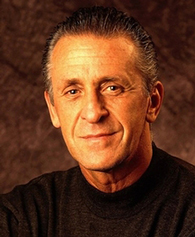
Pat Riley
“Stories ignite people’s interest, success and their involvement.”
Pat Riley
NBA Hall of Fame Coach
Entrepreneur
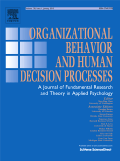
“Donors were more apt to make a charitable contribution to an organization when the appeal featured specific stories about the people their donations were supporting instead of statistics about a problem or need. Same premise holds true when it comes to purchasing products or services from businesses.”
Organizational Behavior and Human Decision Processes Journal

Sara Gavin
“It is so much more powerful and authentic to use real stories. Transformative moments can be shared with and by customers. Stories ignite their aspirations and opens their mind to possibilities.”

Director of Social Media, Expedia

Marsha Linehan, PhD
“Gerard, I share your love of storytelling. You definitely have a wonderful talent for finding and telling stories. Not only do they have the power to shape our behaviors they also play a critical role in allowing hope to emerge. Stories also remind us of the strategies of change we need to reach our goals.”

Developer of DBT Therapy combining behavioral science and mindfulness
Professor & Director, Behavioral Research and Therapy Clinics
University of Washington
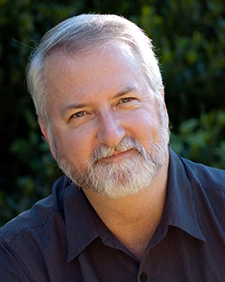
Eric Rasmussen, MD, FACP
“Gerard, this is a remarkable idea. Timely and needed more than the vast proportion of American healthcare system realizes. More than ever providers are spread thinly, with very poor evaluation metrics for who’s at greatest risk for a number of behavioral issues, e.g. suicide, PTSD, addiction. This new methodology and intervention offers implications for organizations desiring to expand outreach, increase effectiveness and improve human-to-human connections.”
Eric Rasmussen MD, FACP
CEO, Infinitum Humanitarian Systems
Instructor, Humanitarian Informatics, Singularity University
Former Chairman, Department of Medicine and Fleet Surgeon, US Navy
Former CEO InSTEDD (TED Prize NGO, Google.org funded)

Paul Smith
“When you have a new strategic plan and you need the staff to understand the vision, buy into it and work toward it, then you need a good story.”
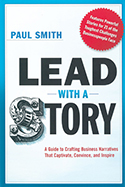
Author Lead with a Story

Melanie Green, PhD
“Audiences immersed in narrative stories are less likely to counterargue with key messages. This approach has greater influence on attitudes and beliefs. There is substantial evidence that storytelling has distinct advantages with respect to stored memory and recall.”
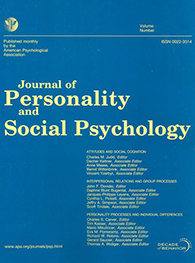
Melanie Green PhD
University of North Carolina
Narrative Impact: Social and Cognitive Foundations
Journal of Personality and Social Psychology

“Storytelling interventions produce substantial and significant improvements in patient health. Especially cancer, high blood pressure and mental health.”
Annals of Internal Medicine

Pamela Rutledge, PhD
“Our brains still respond to content by looking for the story to make sense out of the experience. No matter what the technology, the meaning starts in the brain. This is the psychological power of storytelling. Stories are authentic human experiences. Stories leap frog the technology and bring us to the core of experience.”
Pamela Rutledge PhD, MBA
Director Media Psychology Research Center
Fielding Graduate University -UCLA Extension

Richard Satava, MD, FACS
“Gerard, this digital storytelling strategy is a revolutionary intervention ideal for the emerging vision of healthcare. We are finding that technology alone is not moving the meter in improving patient outcomes at the level we need. Your emotional approach combined with mobile health and big data has great promise for bringing humanity, healthcare and technology together in a meaningful way.”
Richard Satava MD, FACS
Healthcare Future Visionary
former Senior Science Advisor, US Army Medical Research & Command
former Program Manager, Advanced Biomedical Technology Program
Defense Advanced Research Projects Agency – DARPA

“Narrative communication (storytelling) is emerging as an important tool for cancer prevention and control.”
National Cancer Institute
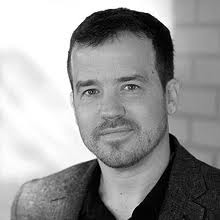
Jonathan Gottschall
“Neuroscience of brains on fiction (viewing stories) gives us a clue. If you slide a person into an FMRI machine that watches the brain while the brain watches a story, you’ll find something interesting–the brain doesn’t look like a spectator, it looks more like a participant in the action. Stories powerfully hook and hold human attention because, at a brain level, whatever is happening in a story is happening to us and not just them.”
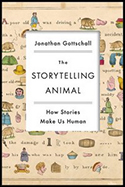
Jonathan Gottschall
Author The Storytelling Animal
American literary scholar
Washington and Jefferson College in Pennsylvania

“Telling a story from experience or hearing others share theirs, creates an opportunity for emotional and personal connection.”
J. Kuchent PhD
Psychological Science
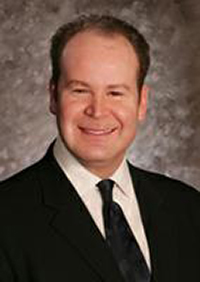
Marc Neff, MD
“Gerard, I believe your tools can transform transform and equip us as physicians…and help address a national public health crises. Much of my profession has gotten consumed in distractions and changes underway in our healthcare system. We have fallen into a pattern of prescribing more and more medicine, a “pill for every ill.” We have gotten away from how we make people better. You’ve opened my eyes to what is possible by facilitating the doctor-patient relationship. Emotive Storytelling takes us back to what made medicine a noble healing profession and moves us forward with an engaging format for both patients and providers to benefit.”
Marc Neff MD, FACS
Director, Bariatric Surgery Program
Eat 2 Beat Obesity

“In the rapidly growing field of health communication, narrative approaches (storytelling) are emerging as a promising set of tools for motivating and supporting health behavior change.”
Health Education and Behavior Journal

John Medina
“The brain processes meaning before detail. It doesn’t pay attention to boring things. Narratives (storytelling) can be strong especially if they trigger emotion and are relevant.”
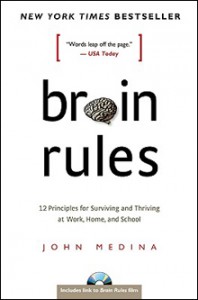
John Medina
Affiliate Prof Bioengineering, U Washington School of Medicine
Specialization: Mental Health, Human Brain Development
Genetics of Psychiatric Disorders
Author Brain Rules

“Storytelling offer distinct advantages: overcoming resistance, facilitating understanding, providing surrogate social connections, and presenting emotional and existential issues.”
School of Public Health, St. Louis University
“When we are trying to build a case for something, most of us instinctively grasp for hard numbers. But in many cases this is exactly the wrong approach. How do we get people to care about our ideas? We make them feel something. How do we get people to act on something? We tell stories.”
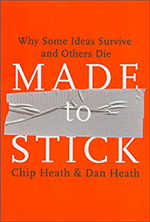
Authors, Made to Stick, Switch and Decisive
“Gerard, your approach is engaging, encouraging and supportive of behavior change and strategic change. It is a method for resolving an issue before it grows into something much worse. It is also a powerful way to drive adoption and accelerate learning. For organizations it can ultimately reduce overall system cost. This is clear, brilliant and spot on.”
Jeffrey Unger
Managing Partner, Stratitia & 2c4 Technologies
Former Chief of Staff, US Army Medical Research and Materiel Command
Former Commander, US Army Medical Command
Former Joint Staff Surgeon, Joint Chiefs of Staff

Jennifer Edson Escalas PhD

“For a company to be successful, it is essential that it understand the power of consumers’ perceptions and word-of-mouth stories about its products, services, and/or brands. – Consumer focused brand storytelling is a strategic priority.”
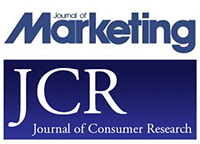
Jennifer Edson Escalas PhD
Associate Professor of Marketing, Vanderbilt University
Journal of Marketing, Journal of Consumer Research

Gerard Gibbons OD
“People move people to change. Technology, apps, pharmaceuticals or coercion doesn’t do it in of themselves. Stories do. Emotive Storytelling is persuasive and effective because it works at the root of behavior change. It is State of the Heart Technology.”

CEO / Chief Storyteller, Brand Story Strategist, Filmmaker, Author
emotivestorytelling.com – The Heart and Science of Persuasion
visualeyes.com – The Power of Storytelling

Brené Brown PhD & Oprah
“Maybe stories are just data with a soul.”
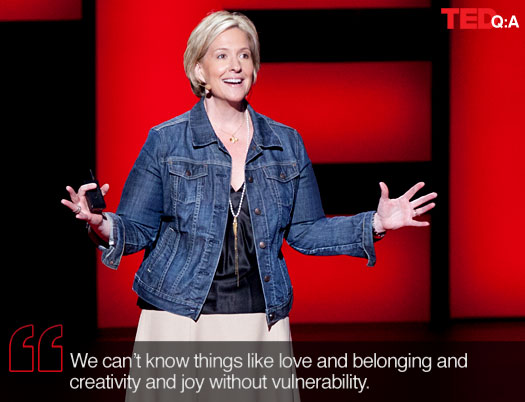
Brené at TED
Brené Brown PhD
Researcher, Storyteller
University of Houston

Keith Oatley PhD
“The brain, it seems, does not make much of a distinction between reading (and stories) about an experience and encountering it in real life; in each case, the same neurological regions are stimulated.”
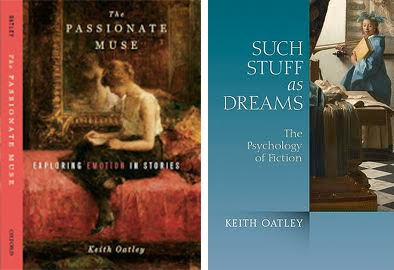
Keith Oatley PhD
Emeritus Prof Cognitive Psychology University of Toronto
Author Such Stuff as Dreams: The Psychology of Fiction
Author The Passionate Muse: Exploring Emotion in Stories

Annie Murphy Paul
“New support for storytelling is coming from neuroscience. Scientists are realizing that narrative communication (stories and storytelling) activate many areas of our brain’s sensory cortex, suggesting why the experience of reading (or viewing) can feel so alive.”

Author The Neuroscience of Your Brain on Fiction
Journalist, The New York Times

“Tell me a fact and I’ll learn. Tell me the truth and I’ll believe. But tell me a story and it will live in my heart forever.”
Indian Proverb
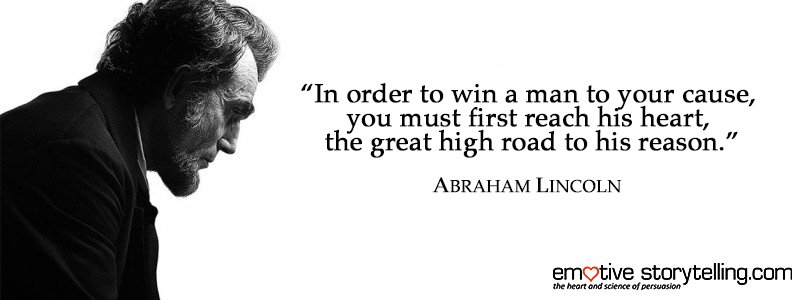
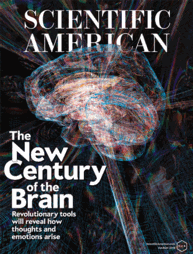
“Scientists recognize that storytelling activates the brain beyond mere word recognition. Researchers have discovered that stories stimulate the brain for learning. They bring insights into a coherent picture and even change how we act in life.”
Anna Kuchment
Scientific American
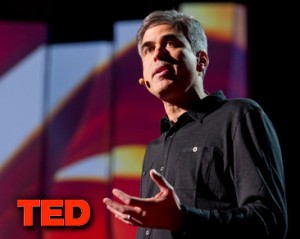
Jonathan Haidt PhD
“Human beings in every culture are fascinated by stories. The human mind is a story processor, not a logic processor.”
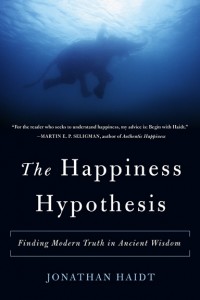
Professor of Psychology, NYU Stern School of Business
Social, Moral and Positive Psychology
Author The Happiness Hypothesis
Author The Righteous Mind: Why Good People are Divided by Politics and Religion

“Stories are about the wisdom of life, they really are. What we’re leaning in our schools is not the wisdom of life. Instead we’re learning technologies, we’re getting information. The classic story of the hero has a message – that technology is not going to save us. We have to rely on our intuition, our true being. That’s the power of story.”
Joseph Campbell
American mythologist
Author The Hero with a Thousand Faces
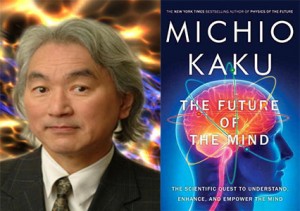
Michio Kaku PhD
“The power of storytelling gets to the power of the mind itself. It’s how we communicate. It’s how we share information. It defines who we are. So much of the brain is devoted to visual image and sensory process. Einstein said unless a theory could be explained in terms of a simple story using image, metaphor and symbol, it is probably useless.”
Michio Kaku PhD
Theoretical Physicist, Futurist
Author Future of the Mind: The Scientific Quest to Understand, Enhance and Empower the Mind




